Effect of energy levels in diet on growth and reproductive performance of Hoa Lan ducks
The experiment was conducted in a duck household in Tien Giang province from 4/2019-9/2020 to evaluate the effect of energy levels on growth and reproductive performance of Hoa Lan ducks. 1800 one-old ducks (360 males and 1440 females) were arranged according to the Completely Randomized Design (CRD) with 3 energy levels or 3 treatments (2850, 2900 and 2950 kcal / kg DM for 0-8 weeks of age; 2700, 2750 and 2800 kcal / kg DM for 9-20 weeks of age and 2650, 2070 and 2750 kcal / kg DM for the laying period) with 3 replicates. Results reveal that energy levels did not effected to survival rate, egg weight and hatching rate. However, in higher energy levels, body weight of ducks at 20 weeks of age was higher (1812, 1855.7, 1872.3g / male and 1637.0, 1673.7, 1700.7 g/female respectively) and laying age was sooner 3-4 days. The laying rate, egg production/hen/52 weeks of laying, feed consumption per 10 eggs in treatment 1 were 60.37%, 219.8 egg and 3.54 kg; in treatment 2 were 70.86%, 221.5 egg and 3.48kg; in treatment 3 were 60.56%, 220 egg and 3.52 kg, there was a significant difference between treatment 1 and 2. Therefor, treatment 2 feeding ducks with: ME 2900 kcal/kgDM, protein 20% for 0-8 week of age; ME 2750 kcal/kgDM, protein 15% for 9-20 week of age and ME 2070 kcal/kgDM, protein 17% for laying period has the best productive performance.

